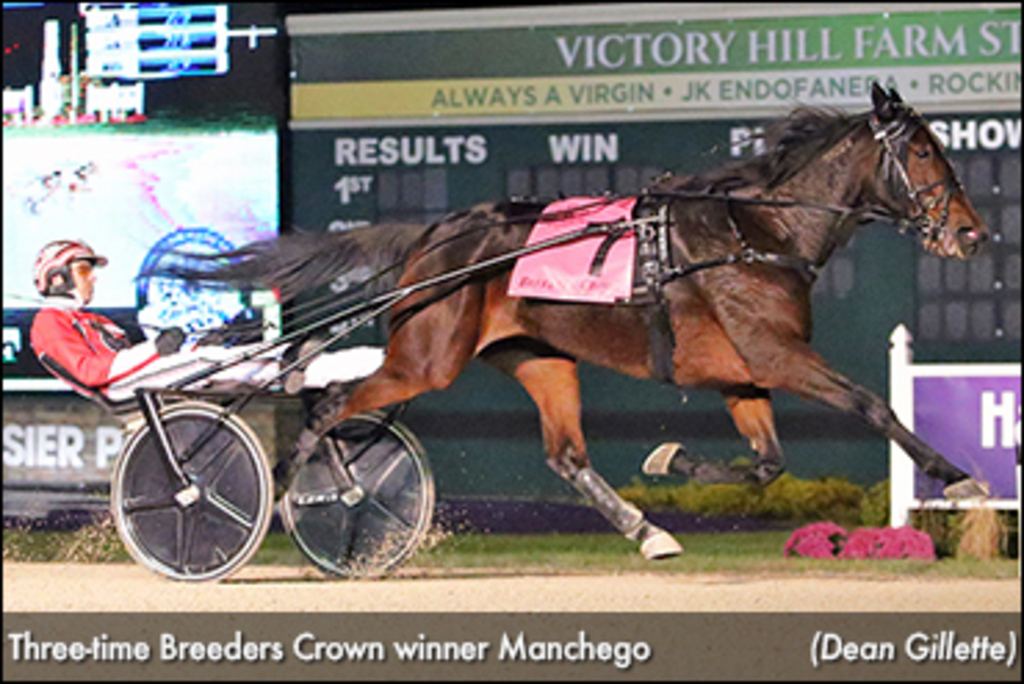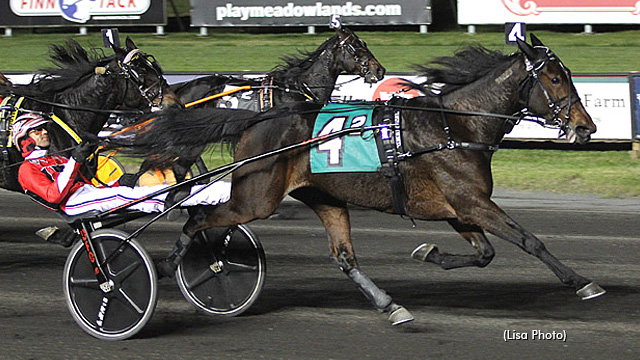'New' Manchego Preps For 2021

When it comes to learning a new trick, Manchego might be able to provide lessons to old dogs.
Already the fastest female trotter in history, the mare adapted quickly to a change in racing tactics toward the end of last season that rejuvenated her campaign and ultimately extended her career.
Manchego was mired in a five-race slump last October when trainer Nancy Takter made several equipment changes in the hopes of getting the then five-year-old mare to relax on the track. Manchego had raced on the front for more than a year — she led at the half-mile point 15 times in a 17-race span — and Takter said, “We decided that going down the road wasn’t working for us anymore.”
Among the changes were the addition of an ear hood and the removal of blinkers in favour of an open bridle. The result was, Takter said, “a whole new Manchego.”

In her first start following the alterations, Manchego came from sixth at the half to finish second to Gimpanzee in a prep for the Breeders Crown. She trotted her final quarter-mile in :25.1. Then came wins in the Breeders Crown Mare Trot and TVG Series Open Trot championship to close the season. Manchego was fourth at the half in both races.
“She’s become multi-dimensional,” Takter said. “It makes her a different horse. It’s hard to do all the work in all the races all the time. If you’re getting pushed to the half every week, eventually you are going to get tired. It’s nice to finish the miles strong and not always be teetering on ‘E’ all the time.
“I think she liked having a target because it was different for her. It was probably fun for her to pass horses rather than have all the pressure on her all the time.”
Manchego’s turnaround helped propel her to the Dan Patch Award for best older female trotter, the second divisional trophy of her career. She also was a Dan Patch Award honoree at the age of two in 2017, when she went undefeated in 12 races.
Her renaissance also resulted in owner Barry Guariglia deciding to postpone Manchego’s retirement, which had been announced in November just prior to the TVG Series championship. Takter revealed in early January that Manchego would be back.
Manchego made her first racetrack appearance of 2021 this past Saturday in a qualifier at The Meadowlands, where she finished third behind Back Of The Neck and Lindy The Great. Manchego, with regular driver Dexter Dunn, was timed in 1:52.3. She was fifth until the stretch and trotted a :25.3 final quarter-mile. None of the 49 other horses to qualify that day came home faster.
“Watching her, I was euphoric,” Takter said. “She was so relaxed and so quiet. She just let Dexter do what he needed to do, and when he asked her to go — and he didn’t really super ask her to go — she just sprinted home.
“She looked absolutely amazing. She’s always had a good gait, but she really looked like she was stretching out nice. I was really happy with her qualifier.”
Takter plans to qualify Manchego one more time ahead of her season opener in the first round of the Miss Versatility Series on May 8 at The Meadowlands.
Manchego, a daughter of Muscle Hill out of Secret Magic, has won 33 of 56 career races and earned more than $2.8 million. Her victories include the 2018 Hambletonian Oaks and Breeders Crown titles at ages two, four, and five.
She is the fastest female trotter ever thanks to her 1:49 victory in the 2019 Allerage Farms Mare Trot at Red Mile and also the fastest female trotter in history on a five-eighths-mile track, with a time of 1:49.3 in last year’s Spirit of Massachusetts at Plainridge Park.
Manchego is the only female trotter to win with a sub-1:50 mile in multiple years. She has been the sport’s fastest trotter in 2019 and 2020.
“If there are horses that have one season like her season, we’re like, oh what a great horse,” Takter said. “But she’s done it so many years now it’s just amazing. She’s one of the greatest that’s ever lived, that’s for sure.
“She genuinely loves to be a racehorse. She’s miserable when she’s off. She likes to be out on the track and doing her work.”
Work she will continue to do, thanks to adapting to change.
(USTA)

